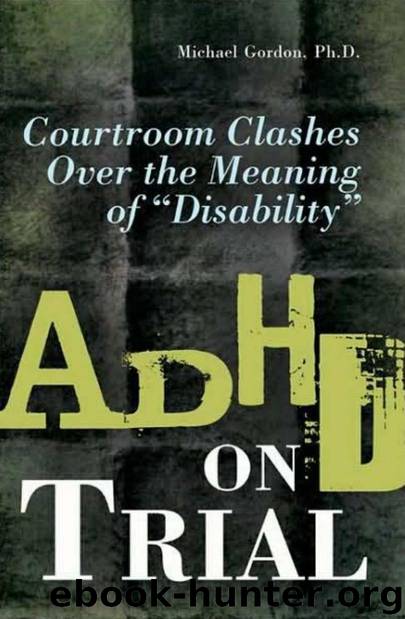ADHD on Trial by Michael Gordon

Author:Michael Gordon
Language: eng
Format: mobi
Tags: Psychopathology, Psychology, Labor & Employment, Discrimination, Disability, Legal History, Praeger, Law, Attention-Deficit Disorder (ADD-ADHD)
ISBN: 9780313360152
Publisher: Praeger
Published: 2009-01-31T22:00:00+00:00
CHAPTER 5
A Cautionary Tale
At the outset, the case of Love v. LSAC was all about diagnostic guidelines, legal standards, and the life of Jonathan M. Love. The guiding theory underlying an effective defense was easily gleaned: the Americans with Disabilities Act requires evidence of abnormal functioning relative to most people;
Mr. Love functions at least as well as most people, end of story. The defense simply had to amass as much ammunition as possible to discredit the idea
that he was substantially impaired.
As transcripts, graduate school applications, medical documentation,
report cards, and other records began to arrive at the law offices of East-
burn & Gray, those plans appeared to become subject to revision. Signs of a change in strategy were evident in e-mails from the lead counsel for the
defense, Ms. Leopold-Leventhal. They often began with a sentence like,
“You won’t believe what I just found out.” Ms. Leopold-Leventhal would
then describe evidence she had received that highlighted significant discrepancies between the Love family account and what emerged from other
sources.
Those discrepancies began to pile higher and higher as weeks passed, to
such an extent that the lawyers told me that they were contemplating making credibility an issue. From what I could gather of their position, the judge had to know the extent to which Mr. Love and his mother had tailored the truth
to help them achieve their goals. If I were in their shoes, I would also want to highlight that the clinicians, in their haste to accept the Love’s story uncritically, had arrived at faulty conclusions via a clinical version of “garbage in, garbage out.”
86
ADHD on Trial
My reaction to this emerging focus on credibility serves as a study in am-
bivalence. Part of me had no stomach for building a case that Jonathan and
his mother may have committed sins of omission, if not commission. Even
if some of the information I had reviewed might not have been wholly accu-
rate, it nonetheless still described the life of a non-disabled individual. Why expend the time and effort to undermine the plaintiff’s credibility if we already had sufficient grounds for arguing the case based on the available evidence? The answer the LSAC lawyers gave was identical to what I have
heard from many others in similar circumstances: “Because you never know
what a judge will do, you hit them with absolutely everything you have at
your disposal.” My sense is that lawyers are trained to assume that judges
will not always react as anticipated.
Endeavoring to discredit the witness also felt like far less noble a strategy than the one the case followed initially. Like it or not, many people are apt to shave the truth if it gives them an advantage. I imagine that most parents will do just about anything to make life better for their children, even if that involves some fact stretching along the way. Sticking to legal arguments,
especially given their strength in this case, struck me as a far cleaner method.
Opposing those more noble sentiments were others rooted in the sense that
the court should know the downsides of letting an individual “self-qualify”
as impaired under the Americans with Disabilities Act.
Download
This site does not store any files on its server. We only index and link to content provided by other sites. Please contact the content providers to delete copyright contents if any and email us, we'll remove relevant links or contents immediately.
Day by Elie Wiesel(2301)
The Age of Genius by A. C. Grayling(2217)
Gideon's Spies: The Secret History of the Mossad by Gordon Thomas(2008)
The Gulag Archipelago (Vintage Classics) by Aleksandr Solzhenitsyn(1776)
FATWA: Hunted in America by Pamela Geller(1753)
Columbine by Dave Cullen(1547)
The Rule of Law by Bingham Tom(1379)
Examples & Explanations: Administrative Law by William F. Funk & Richard H. Seamon(1373)
Men Explain Things to Me by Rebecca Solnit(1361)
Anatomy of Injustice by Raymond Bonner(1310)
Three Cups of Tea by Greg Mortenson(1308)
That Every Man Be Armed by Stephen P. Halbrook(1276)
ADHD on Trial by Michael Gordon(1275)
Gideon's Spies by Gordon Thomas(1257)
Palestinian Walks by Raja Shehadeh(1188)
The Source by James A. Michener(1182)
Fast Times in Palestine by Pamela Olson(1152)
Constitutional Theory by Carl Schmitt(1087)
Nothing to Envy by Barbara Demick(1081)
